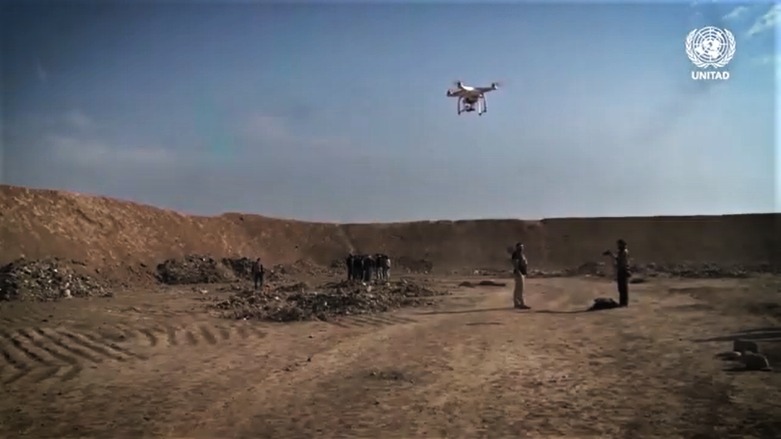UN releases new video presenting evidence of ISIS genocide against Yezidis in Iraq

ERBIL (Kurdistan 24) - The United Nations’ body investigating crimes of ISIS in Iraq and Syria released a video on Thursday that outlines a wide range of evidence that it says amounts to genocide against the Yezidi (Ezidi) religious minority beginning in 2014 in the disputed north Iraqi district of Sinjar (Shingal).
The new 21-minute video came after Karim Khan, head of UN Investigative Team to Promote Accountability for Crimes Committed by Da’esh/ISIL (UNITAD), told the UN Security Council that his team had collected “clear and compelling evidence” that ISIS extremists committed genocide against the Yezidi community.
Part of UNITAD's mandate requires investigators to document such actions that could be submitted by prosecutors in war crimes cases in various courts.
“Developed in collaboration with SITU Research, a visual investigations practice, the video synthesizes the testimonial, documentary, digital and forensic evidence collected by the Team in this investigation,” UNITAD announced in a press statement.
“From the beginning of our work in 2018 we have sought to integrate the most advanced technological solutions to the challenges posed by the depth and scale of crimes committed by ISIL (ISIS),” said Khan.
“The video released today with SITU Research provides a window to some of the results produced in this effort and demonstrates how we can take evidence collected on the ground in Iraq and present it in a compelling narrative in national courts.”
Brad Samuels, Director of SITU Research, added, “This video presents a vast array of disparate assets assembled into a coherent account of these complex and tragic events.”
“No single source of data tells the whole story but our collaboration with UNITAD seeks to organize, synthesize and make accessible the facts of this case.”
According to Nadine Maenza, Commissioner at the US Commission on International Religious Freedom (USCIRF), “This UNITAD video is important as it uses new technology to pull evidence together using video, photos, maps, graphics, imaging, documents, and even cell records, to explain the actions ISIL took leading up to genocide against the Yazidi community.”
“I thought I had a thorough understanding of these events,” she added, “yet it helped me better understand the timeline and how ISIL methodically planned their actions.”
The UNITAD statement explained that the video “demonstrates the integration of 3-D laser scans of mass grave sites into drone footage, while autopsy reports and DNA results of individual victims can be placed visually at the specific locations they are identified in the crime scene.”
Khan previously said that UNITAD had received “excellent support” from the Kurdistan Regional Government (KRG) on legislation to establish a special criminal court on the crimes committed by the terrorist organization.
Read More: UNITAD chief says there’s ‘excellent support’ from KRG on ISIS war crimes court
The emergence of the Islamic State and its violent assault on the Ezidi-majority city of Shingal in 2014 led to the displacement of hundreds of thousands of members of the community. Most of them fled to the Kurdistan Region, while others resettled to neighboring countries in the region or to Western states.
Others were not as lucky and remained stranded in the war zone, where they were subjected to atrocities and mass executions at the hands of the extremist group for years. ISIS militants forced women and girls into sexual slavery; kidnapped their children; forced religious conversions; executed scores of men; and abused, sold, and trafficked women and girls across the areas they controlled in Iraq and Syria.
Thousands of Ezidis still remain missing.
“It is frustrating to watch how ISIL surrounded the village of Kosho on August 5th and had 10 days to plan their mass atrocities and kidnapping without international intervention,” said Maenza, the US commissioner.
“It is important that we learn from this video and from our mistakes, so we can better stop mass atrocities and genocide in the future.
Editing by John J. Catherine